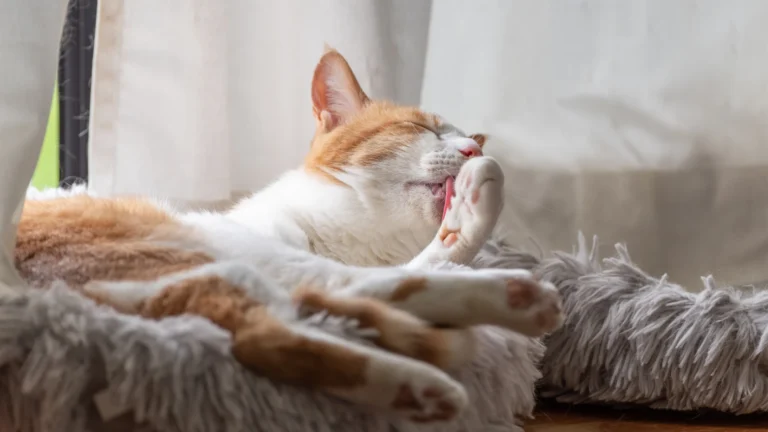Why Do Cats Lick Themselves
Cats are some of the most fascinating and graceful creatures around, aren’t they? One of their most recognizable habits is grooming themselves by licking their fur. But have you ever wondered why they do it? Beyond looking adorable, a cat’s self-grooming routine serves several important purposes. From keeping their fur clean and tangle-free to regulating their body temperature and showing affection, licking is vital to their daily lives.

To Keep Clean
One of the most charming things about cats is their dedication to grooming themselves. They have amazing tongues that are rough and covered in tiny, hook-like structures called papillae. These tiny hooks are composed of keratin, the same material found in human nails, which gives the tongue its characteristic rough texture. They help cats remove dirt and loose fur. They also act as a comb, detangling their coats and spreading natural oils to keep their coats shiny and smooth.
To Regulate Their Body Temperature
Cats manage their body temperature differently than humans. Unlike us, cats do not have sweat glands. When they lick their fur, the saliva they deposit helps to cool their skin as it dries up. This process acts like a natural cooling system, allowing them to regulate their body temperature effectively.
Spreading Natural Oils
Every time your cat licks itself, it spreads natural oils across its fur, keeping it sleek, shiny, and well-moisturized. Think of it as applying a leave-in conditioner, ensuring its coat stays soft and resistant to the elements. These oils also act as a protective barrier, preventing their skin from drying out.
Stimulate Blood Circulation
When cats groom themselves, the repetitive licking motion stimulates blood circulation in their skin, essential for delivering vital nutrients and oxygen to hair follicles. This increased blood flow helps keep their fur soft and shiny and supports skin health by promoting the natural oils that protect against dryness and irritation.
Reducing Stress and Anxiety
Grooming is a soothing activity for cats. When they feel anxious or stressed—perhaps after a vet visit or during a thunderstorm—licking themselves can help calm their nerves. This behaviour, known as displacement grooming, provides a sense of security and control in stressful situations.
Establishing Their Territory
Cats have pheromones in their saliva that are crucial to their social behaviours and territory marking. When a cat licks itself, it spreads its scent across its body, and when they lick another being, it signifies that the cat is claiming that individual and establishing a connection. So, when your cat gives you gentle licks, it means more than just affection. It shows their love, acceptance, and desire to bond with you.
When Grooming Becomes Excessive
While grooming is a natural behaviour for cats, excessive licking can indicate a deeper issue that requires attention. If you see them grooming themselves more than usual, it can indicate:
- Allergies could stem from food ingredients or environmental triggers like dust, pollen, or mold.
- Fleas or Skin Parasites can cause intense itching, leading to relentless grooming.
- Pain or Discomfort such as arthritis or injuries may cause cats to lick specific areas to alleviate their discomfort.
- Stress or Anxiety in their environment or routine can contribute to emotional distress, prompting excessive grooming as a coping mechanism.
If your cat’s grooming behaviours appear excessive or unusual, a visit to the veterinarian is essential. The veterinarian can help identify the underlying cause and ensure your cat receives the care it needs to thrive and feel comfortable.
